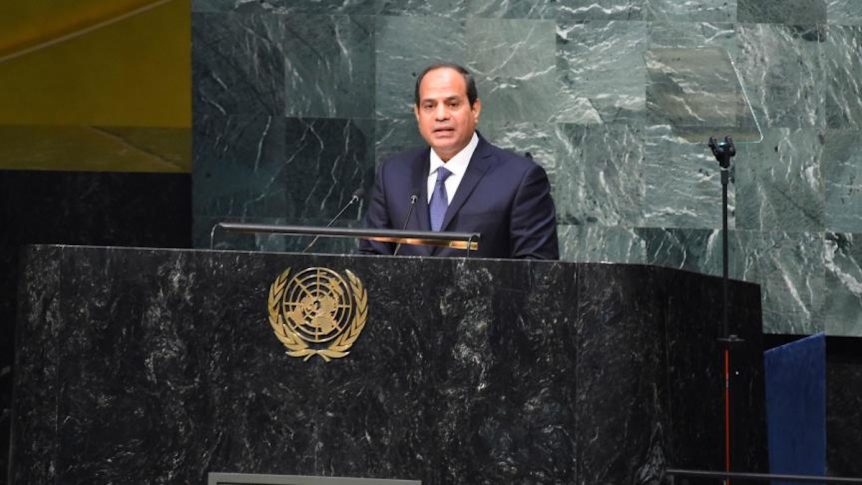From November 6 to 18, Egypt will host the COP27. Although it is presented as an “African COP” and therefore an opportunity to prioritize the concerns of regions most affected by climate change, it will take place in the context of a deep human rights crisis in Egypt.
Following Abdelfattah al-Sisi’s seizure of power in 2013, the increasing repression of all peaceful dissenting voices has gradually plunged the country into a human rights crisis. Those imprisoned, arrested or harassed simply for exercising their rights now number in the thousands. Human rights abuses are mostly carried out under the pretext of fighting terrorism. And the European Union and its member states turn a blind eye in the name of the role Egypt is supposed to play in regional stability, the fight against terrorism, migration control, and now, the diversification of European energy sources.
The Egyptian authorities’ draconian restrictions on rights and freedoms extend even to climate experts and environmental activists. And while the Egyptian government seems to have adopted a slightly more inclusive policy in the run-up to COP27, it only applies to civil society organizations that agree with it. For example, when the authorities recently had more than 390,000 square meters of green space in urban areas removed without consultation with local residents, the latter had no effective recourse at their disposal.
The role of civil society in the fight against the climate crisis, including through its participation in climate conferences, is essential to defining inclusive and ambitious climate policies. This COP should therefore give a central place to African and global south civil society organizations. However, the repression and the human rights crisis in Egypt has added to the administrative and financial obstacles to prevent a broad, effective and safe participation of these organizations and activists, warned UN experts two weeks ago.
The Egyptian government claims that its announced human rights efforts since 2021 reflect a change in approach. However, it seems clear that, like the National Human Rights Strategy, these weak efforts are neither genuine nor durable. As the Egyptian authorities are sensitive to international criticism, it is mostly their human rights image they have sought to improve, particularly in the run-up to COP27.
Indeed, the number of prisoners released or pardoned since April 2022, estimated at 676, is far lower than the number of people whose arbitrary detention has been renewed or newly ordered. It also represents an extremely small fraction of the total number of arbitrarily detained prisoners, thousands of whom are still languishing behind bars in Egypt in cruel and inhumane conditions, exposed to multiple human rights violations, torture, and other forms of ill-treatment, including for female prisoners. Egypt must lead a real change of policy. Convictions after unfair trials must be overturned. All those arbitrarily detained for simply exercising their rights to freedom of expression, peaceful assembly and association must be released immediately and unconditionally. They must include prominent Egyptian-British activist and blogger Alaa Abdelfattah, who has been on hunger strike for 200 days and is at risk of death.
Egypt must also initiate legislative changes, including the 2019 law on the functioning of civil society organizations. Practices must also change to guarantee and protect the space for independent civil society, including human rights activists, to express themselves, meet, and work without fear.
As COP27 approaches, there is also an urgent need to enable media coverage, by lifting the authorities’ tight control over the media. “Almost all media outlets are now under the orders of the government,” said Reporters Without Borders, adding that Egypt remains “the champion of repression against journalists” in 2022. Egypt must stop blocking access to more than 550 websites and release all journalists and bloggers behind bars for exercising their freedom of expression. Twenty journalists are currently behind bars in Egypt.
There will be no climate justice without civic space and human rights. Belgium and all of Egypt’s international partners must act as quickly as possible, before, during and after COP27, by using all available levers to improve the human rights situation in Egypt. Indeed, they must ensure that the measures taken are not reversed after COP27, given the real risk of reprisals against Egyptian civil society once the spotlight is no longer on Egypt. The space for independent civil society in Egypt must be guaranteed in the long term, it is in the interest of the country but also of the global struggle against climate change.
Signatories: Alexis Deswaef, vice-président de la Fédération International pour les Droits Humains ; Arnaud Zacharie, secrétaire général du CNCD-11.11.11 ; Bahey el din Hassan, directeur du Cairo Institute for Human Rights Studies ; Danny Jacobs, directeur général du Bond Beter Leefmilieu ; François Graas, coordinateur des campagnes d’Amnesty International Belgique Francophone ; Ludo De Brabander, porte-parole de Vrede vzw ; Mathias Van Hove, coordinateur de Palestina Solidariteit ; Nicolas Van Nuffel, président de la Coalition climat ; Pierre Galand, président de l’Association Belgo-palestinienne ; Rasmus Alenius Boserup, directeur exécutif de Euromed Droits ; Simone Susskind, fondatrice de Actions in the Mediterranean ; Thérèse Snoy, présidente des Grands-Parents pour le Climat ; Véronique Wemaere, directrice de Solsoc; Mathieu Verjans, secrétaire national de la CSC ; Thierry Bodson, président de la FGTB ; Michel Vanhoorne, coordinateur du Forum Gauche Ecologie.
Source: Le Soir
Share this Post

